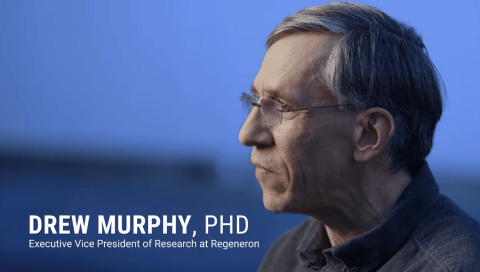Research & Preclinical Development
Pioneers In Antibody Medicine
February 13, 2020
Antibodies have been at the heart of our research efforts for nearly thirty years, and some might say they are finally stepping into the limelight. See how antibodies are used as new and established medicines, including for infectious diseases.
By: Drew Murphy, PhD, Executive Vice President, Research

I don’t remember a time when I didn’t love science, although I was not initially drawn to biology. As a young boy watching Neil Armstrong climb down the ladder of the LEM (Lunar Excursion Module for the currently young and/or non-space-crazy) and set foot on the moon made me want to design spaceships. A year of college as an astronomical engineering major made me realize that I was much more interested in entering the exciting new field of molecular biology than I was in becoming an engineer in the space race. Through a circuitous route, I eventually began working on creating antibody drugs. Ironically, I had become aware of antibodies at an even younger age by watching Cora, the character played by Raquel Welch, get attacked by antibodies while traveling as a miniaturized scientist inside of a human body in the sci-fi movie Fantastic Voyage.
Antibody drugs are based on one of the key principles of human biology by mimicking the natural defenses of the human body within the immune system. All of our bodies naturally produce billions of different antibodies, and antibody medicines harness that science to target and attack a specific disease – meaning you can use antibody medicines for a wide range of diseases, including autoimmune diseases and cancer.
In my twenty years at Regeneron, I have been lucky to be a part of discovering exciting new antibody drugs and have seen many of them make it across the approval “finish line” where they can be given to patients in need.
As the Regeneron history goes, by the time our first neurotrophic factor hit a wall in Phase 3 in 1997, the team had already begun to focus on new therapeutic solutions, eventually including antibodies. By 2006, our first fully human antibody had entered clinical development. And now, we’re launching our new educational initiative focused on the field of antibody medicine, and how it continues to evolve and improve.
While Regeneron scientists have pushed the field forward, antibody science itself isn’t new – in fact, it dates back to the 1700s when scientist Edward Jenner discovered a vaccine for smallpox, the only infectious disease to be completely eradicated worldwide due to the generation of antibodies that enabled the body to defend against the disease. Science has evolved since then: while vaccines allow us to prevent disease by administering antibodies, we’ve also discovered ways to use antibodies to fight, or treat, diseases. Antibody treatments have become standard for certain types of cancer, allergic diseases, arthritis, multiple sclerosis and heart disease, and are being explored in even more areas.
So how are antibody medicines different from other categories of medicines, like those delivered via pills?
Let me give you some specifics:
- Antibody medicines are derived from living organisms, not from chemical processes like most pill-based medicines.
- They’re large molecules, so they can’t be contained in a pill or absorbed through the stomach like smaller molecule medications that are typically delivered orally. However, this also means that they often last longer in your body and may need to be dosed less frequently.
- They’re highly specific, which means they’re designed to target a specific antigen.
- Early antibody medicines were administered intravenously, requiring the patient to visit a clinic, but now some antibody medicines can be administered by subcutaneous injection which can be done at home in some cases.
While many people may have heard of antibodies in their high school science class, or in a sci-fi movie, like I did, they probably don’t think about them much today. We want folks to know how this biological element inspires new and established medicines, and what’s on the horizon for further breakthroughs in treatment. Knowing more can help answer questions like ‘why are some of my medicines pills and some are injections?’ or ‘how exactly does this medicine attack cancer cells without harming my healthy cells?’
Knowing the fundamentals about antibody medicines can also help with understanding what’s next in this field of care. We’re working on novel antibody solutions called ‘bispecific antibodies’ that we think could further improve ‘standard’ antibodies by recruiting additional components of the immune defenses seen in nature. With a little luck and a lot of hard work, we’re just beginning to show what antibody science can do for humanity. I invite you to learn more about antibody medicine.

Last updated: December 2024